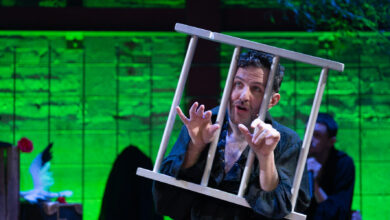Review: Sleepover (review no1), EdFringe 2022
Just The Tonic At The Caves – Just The Big Room
CUMT bring a funny and unique show to the Fringe and isn’t afraid to address themes of inter-racial dating, female pleasure, and pegging. summary
Rating
Good
[Note: due to dairy errors, this is one of two reviews for this show. You can read the other here.]
This show by Cambridge University Musical Theatre Society features a trio of young women, all hilarious in both dialogue and song. They tell the story of three friends who, before going off to university, jobs, and their separate ways, come together for a sleepover. This is secretly a ploy from the host to be able to ask her best friends about sex and relationships.
Each performer brings a different perspective to the conversation, with the host being slightly shy about the topic. One friend brings significantly more experience to the conversation (despite being religious with an overprotective mum) another is inexperienced but confident. There’s an additional final friend who it turns out can’t attend, only making a cameo appearance at the end to provide a sweet ending to the show.
Sleepover manages to portray an intimate bedroom environment, complete with movies and popcorn, with minimal set and effective props. The original songs are catchy and witty, and have been going round and round in my head for days afterwards. However the sound quality could have been improved upon – this performance was one of the first in the run so hopefully this has since been rectified – to ensure the audience can clearly hear some clever lyrics. And it’s true that they still require further developement to make them a fuller experience. But with the performers so full of enthusiasm and energy, they manage to carry the show through at a nice pace.
There is a significant tone change as we near the end. The host sings a beautiful but devastating ballad about her own experiences which – whilst contrasting with the up tempo and energetic songs ‘White Man Ban’ and ‘Shake Your Titties’ – reminded me of how friendship groups often go from dancing, laughing, and talking about their sexual and dating preferences, to sharing their deepest secrets in the space of one interaction. This really solidifies the show’s portrayal of friendship and allows audiences to consider and appreciate their own friends and their own conversations.
Sleepover is funny, honest, and an emotional portrayal of young women and friendship. It tackles important and relevant themes in a humorous way, demonstrating the importance of making theatre for young people, people of colour, and women generally, as well as exploring their thoughts on sex, relationships, and friendships.
Written by: Laura Chan
Directed by: Mia Urwin
Produced by: Elaina Ough
Lighting Design by: Tungsten Tang
Sleeopover plays at EdFringe 2022 until 28 August. Further information and bookings here.







